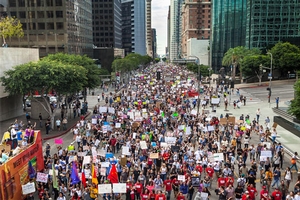Research
Does Political Participation or Affluence Affect Policy Responsiveness?

Political scientists have long studied what influences political participation and voter turnout. American University School of Public Affairs Professor Jan Leighley wanted to find out whether activism beyond voting really affected how lawmakers act.
"We just don't have much, if any, evidence that citizen participation affects policy making," said Leighley. On Dec. 6, Cambridge University Press published a paper online, "Representation in an Era of Political and Economic Inequality: How and When Citizen Engagement Matters," by Leighley and co-author Jennifer Oser of Ben-Gurion University in Israel.
The study examines whether citizen activism influences policy choices of members of Congress. The researchers analyzed different issues and different types of political activity. They compared the policy preferences of participants with the policy preferences of nonparticipants and showed that the participant preferences were aligned more closely with the roll call votes of their elected leaders. They discovered that in the case of the Affordable Care Act (ACA), when low-income constituents become politically active beyond voting (e.g., contacting their legislators, conveying their views), their preferences were represented nearly as well as those of the wealthy.
"There is common discussion and emphasis on the dominance of the opinions and behaviors of the wealthy being better represented than the preferences of the poor," said Leighley. "That is certainly true in a lot of research. But what is notable is that we found that when poor people participate, you can close that gap substantially."
Low-income Americans tend to vote less often and are not as politically active as the rich, but on some issues, the study showed that the magnitude of participation can be enough to counter that influence.
While voting is the main way that citizens register their policy preferences through their elected officials, it is important to study the impact of activism because new issues may arise two, four, and six years between elections, said Leighley. In addition, the rise in the number of ways that Americans are voicing their opinions (through various online platforms and protests) begs the question: Do those efforts make a difference?
"Participation is an expressive act that makes people feel good about themselves," she said. "But ultimately, we want to know whether policy and decision-making in a democracy reflects what citizens do, say, and want."
The data used in the research was drawn from the 2012 Cooperative Congressional Election Study, which includes questions about constituents' political engagement, including voting in the general election, making political donations, and other political activities such as attending a political meeting, engaging in campaign activity, or displaying signs.
The researchers also analyzed congruence between citizen policy preferences on votes for the Keystone XL Pipeline, the repeal of "Don't Ask, Don't Tell," and the Korean Free Trade Agreements, but did not uncover the same connection between citizens and their representatives.
There is evidence that the ACA is one policy issue for which additional political activity makes a difference for preference congruence, even - and especially - among the less affluent.
"With all the attention given to the ACA, how highly partisan and charged it was, and the clarity around it - if participation is ever going to matter, in some sense, we had better find it there," said Leighley.

